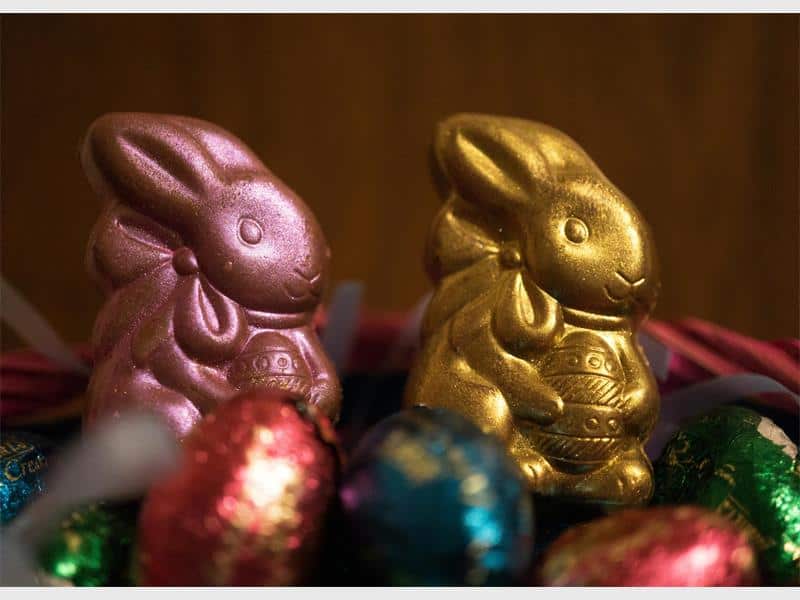As Easter approaches, it is important to be aware of the hidden dangers the traditions associated with this holiday can pose for pets.
Dr Rhynhard Goosen from the Sherwood Gardens Animal Clinic told the Brakpan Herald many traditional Easter treats and decorations contain ingredients that are toxic or can pose harm to animals, particularly dogs and cats.
He shared some essential information, and do’s and don’ts for pet owners to take note of:
• Why Easter treats can be dangerous for pets
Some Easter treats contain ingredients that are harmful to pets, and chocolate, hot cross buns, and treats with xylitol (birch sugar) are particularly dangerous. Even small quantities can cause serious health issues, including poisoning, kidney damage, and even death.
• Are some animals more at risk?
Most of these treats are dosage dependent, and are therefore more toxic to smaller animals. Older animals and those with certain health conditions such as heart failure, are also at higher risk. Small puppies and older animals also struggle to metabolise and excrete these harmful ingredients.
• Common pet emergencies around Easter
Chocolate poisoning. When doing an Easter egg hunt, take note of where all the “treasures” are hidden and ensure that all Easter eggs are accounted for. Grape and raisin toxicity .
Xylitol poisoning. Some products also label xylitol as birch sugar. This is a common sugar substitute that can result in dangerously low blood sugar levels and possibly also liver damage.
Easter décor. Objects such as plastic sweet wrappers and toys can be swallowed, and this can lead to intestinal obstructions.
Easter lilies are highly toxic to cats.
• Why are chocolate, hot cross buns and xylitol toxic to dogs?
Chocolate contains theobromine, which is an alkaloid found in cacao plants and is the primary reason chocolate is toxic to many animals.
Humans can break down and excrete this alkaloid with ease, but many animals cannot, which leads to it accumulating in their systems.
This accumulation leads to symptoms such as vomiting, diarrhoea, increased heart rate, seizures, and in severe cases, death.
Due to their elevated theobromine content, dark chocolate and baking chocolate pose a greater risk compared to milk chocolate.
Some small amount of caffeine in chocolate can also cause harm in susceptible pets. Many baked goods contain grapes and raisins, such as hot cross buns. These toxins can lead to kidney failure. Grapes and grape leaves contain tartaric acid.
Scientists believe that tartaric acid could be what makes grapes toxic to dogs. Xylitol/birch sugar is found in sugar-free sweets and gum. Consuming these will lead to a rapid release of insulin which in turn leads to an extremely low blood sugar level (hypoglycaemia) resulting in seizures and possible liver damage.
Easter lilies are extremely poisonous to cats, and just one to two leaves (or even the pollen) can result in death, mostly due to kidney failure.
ALSO CHECK: Winner walks away with R10k from chilli competition
• How quickly do symptoms appear?
Depending on the toxin/poison, symptoms usually develop within 30 minutes to several hours after ingestion. The most common symptoms to look out for are gastro-intestinal symptoms such as diarrhoea and vomiting, excessive salivation, weakness or lethargy or becoming depressed, tremors or seizures, increased heart rate, and difficulty breathing.
• What to do if you suspect poisoning
Remove the toxin, whatever it may be, if possible, and keep the pet away from the source. Act immediately and phone your veterinarian or the poison control help line. Make sure to have these numbers saved on your phone. Make sure to provide information on what your pet ingested and the amount.
In the case that your primary veterinarian is unavailable, make use of the closest 24-hour veterinary clinic. Before making your pet vomit (which can exacerbate symptoms), first supply your vet with the amount consumed if possible and await instruction.
Poison kits can be found at multiple veterinary practices and should therefore be kept at hand in case of emergencies. Do not give milk, eggs or anything else as this can also increase absorption of certain toxins.
Another good product to keep at hand is activated charcoal. Veterinary practices have easy-to-administer activated charcoal, calibrated according to different weight categories. Monitor your pet for hours afterwards and act if deterioration is seen.
The contact details for vets in Brakpan are:
• Sherwood Gardens Animal Clinic: 011 744 4668 (closed from April 18 to 28).
• Dalvet Animal Clinic: 011 740 5441
• St Francis Animal Clinic: 011 915 5613
Vets in neighbouring areas offering 24-hour service:
• Northmead Veterinary Clinic: 065 538 0397
• Alberton Veterinary Clinic: 011 869 7258.
At Caxton, we employ humans to generate daily fresh news, not AI intervention. Happy reading!







